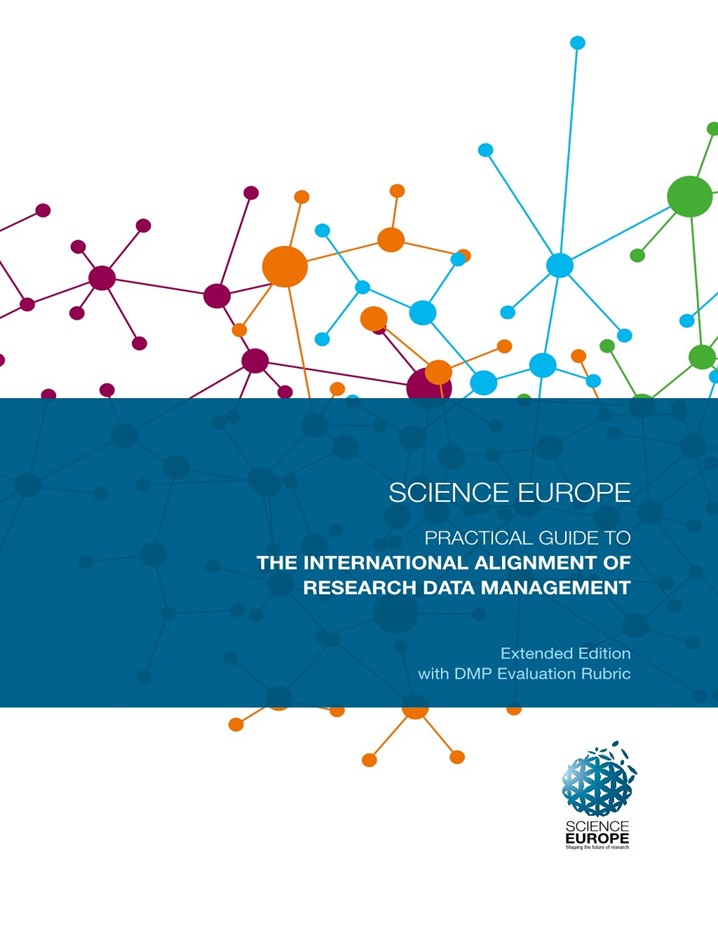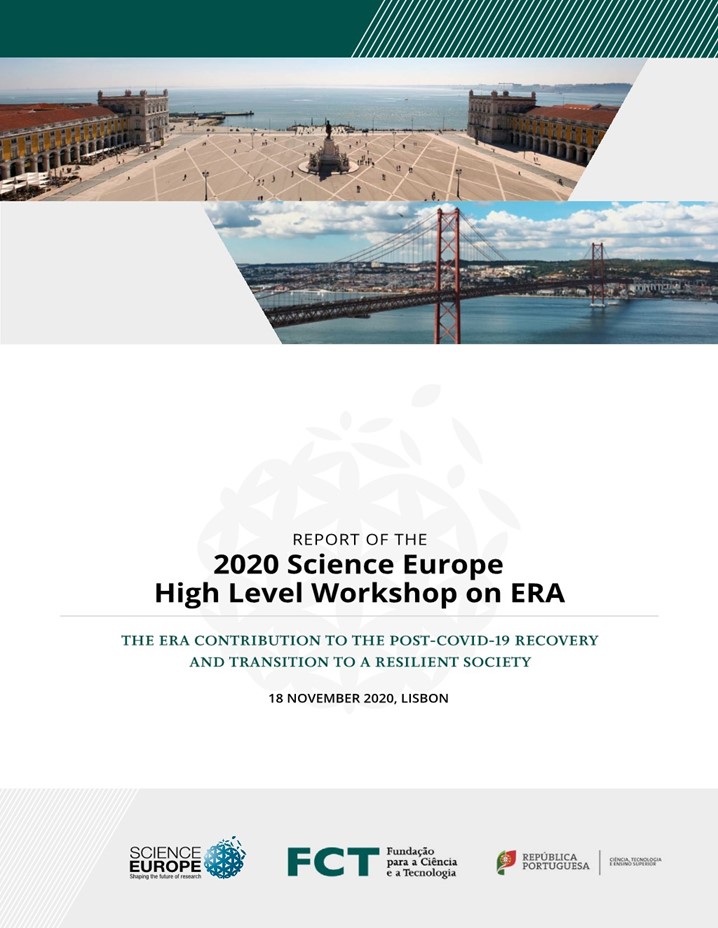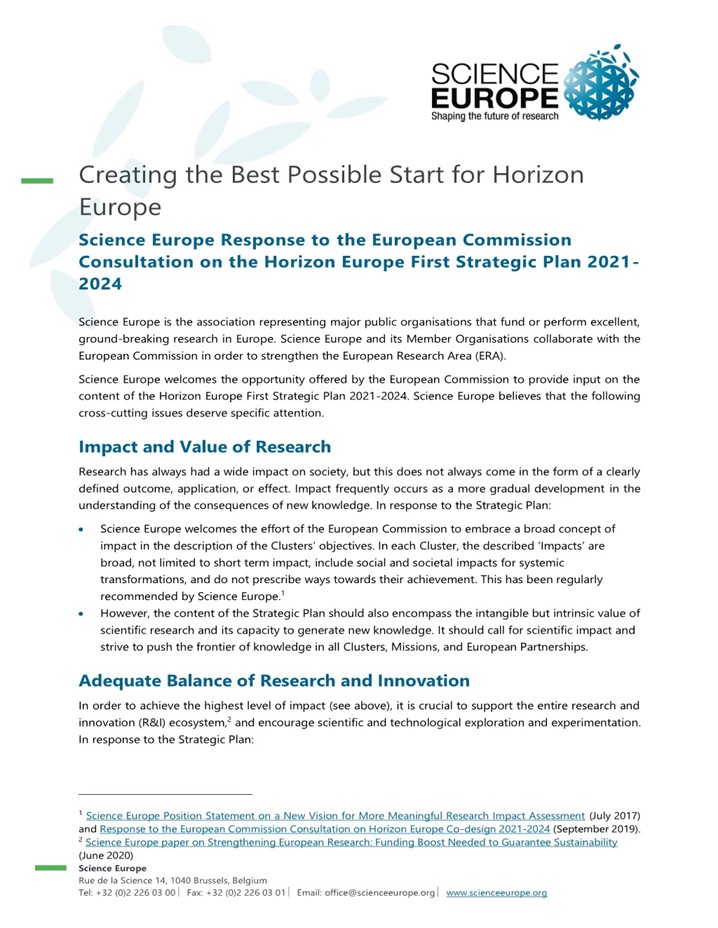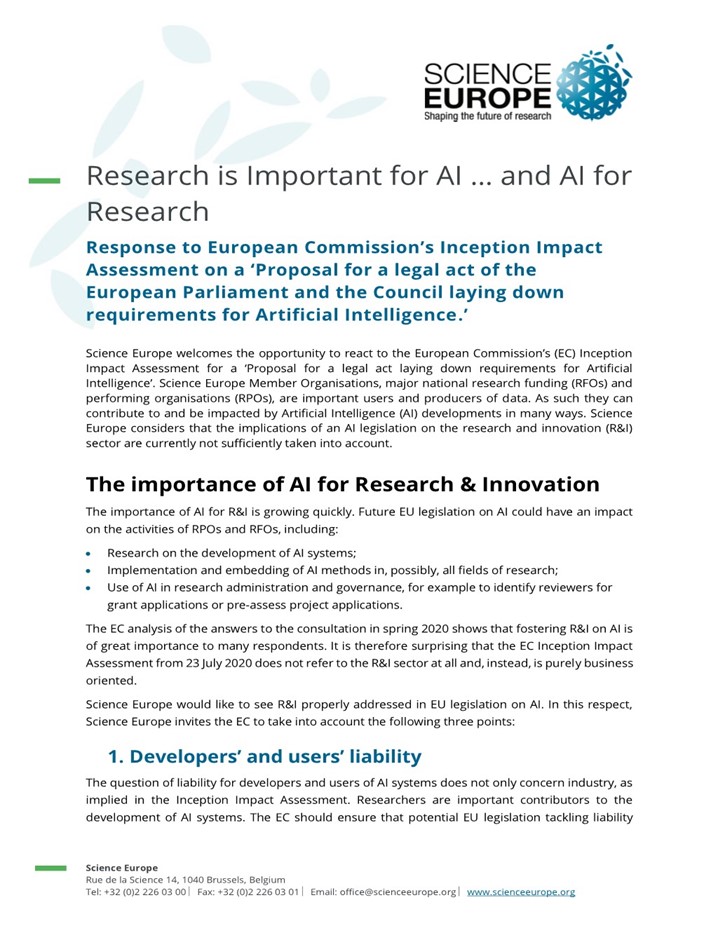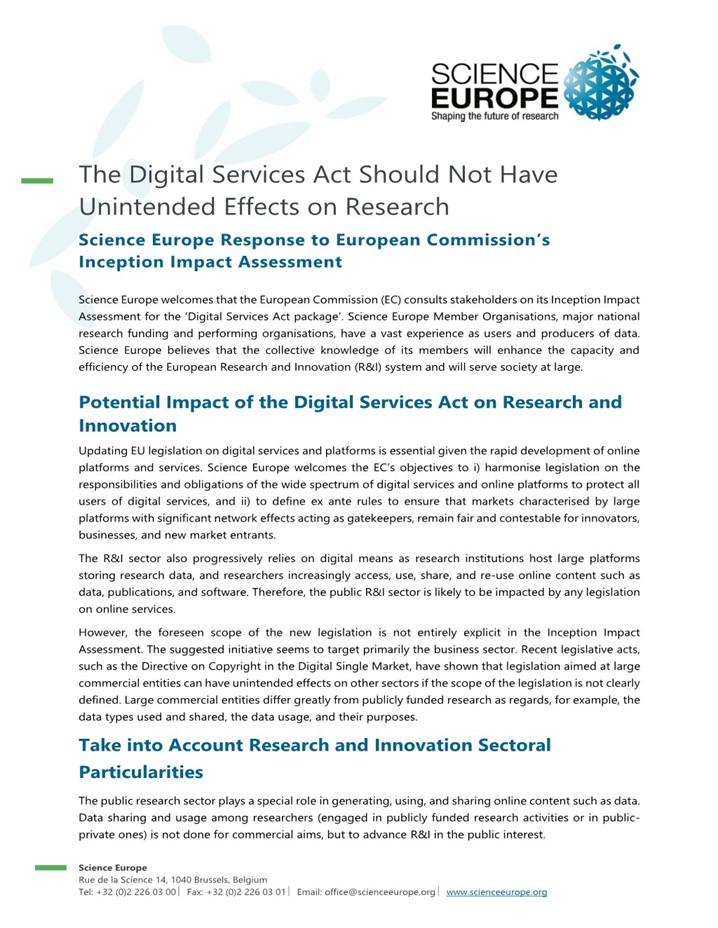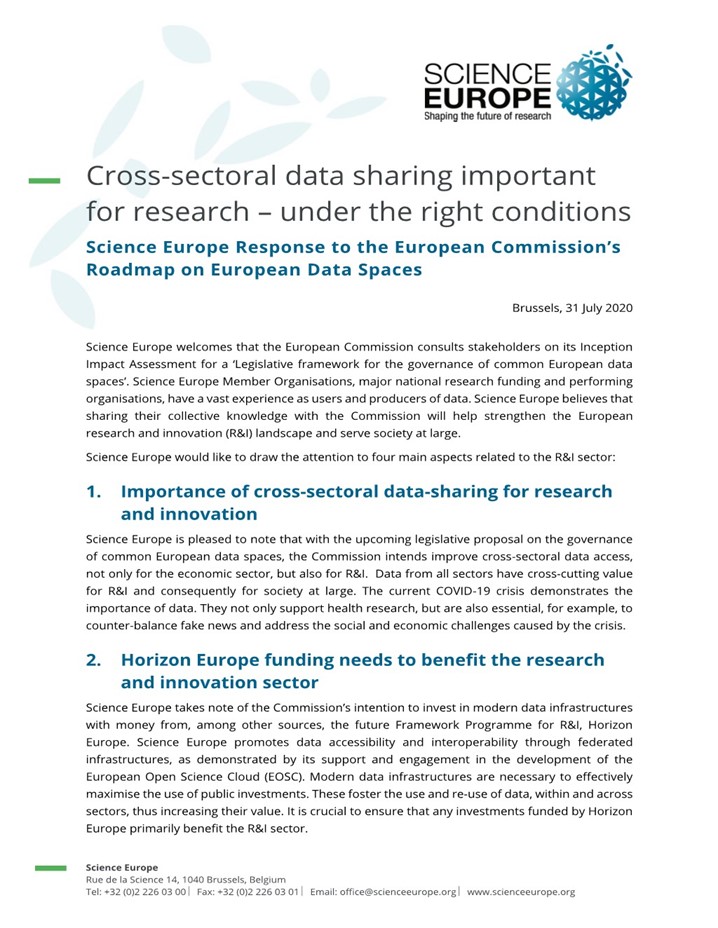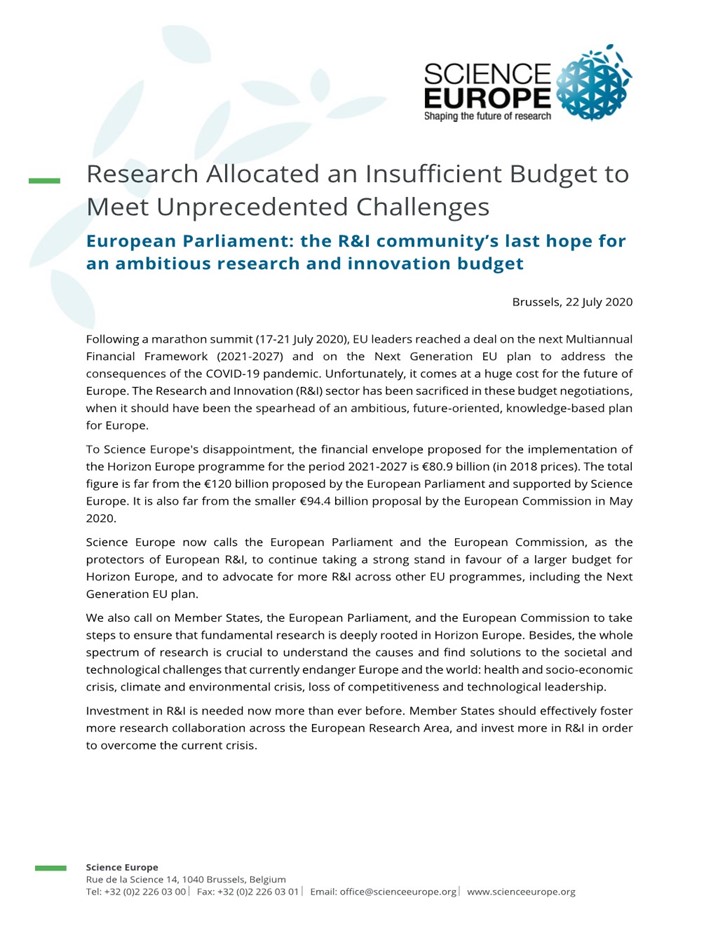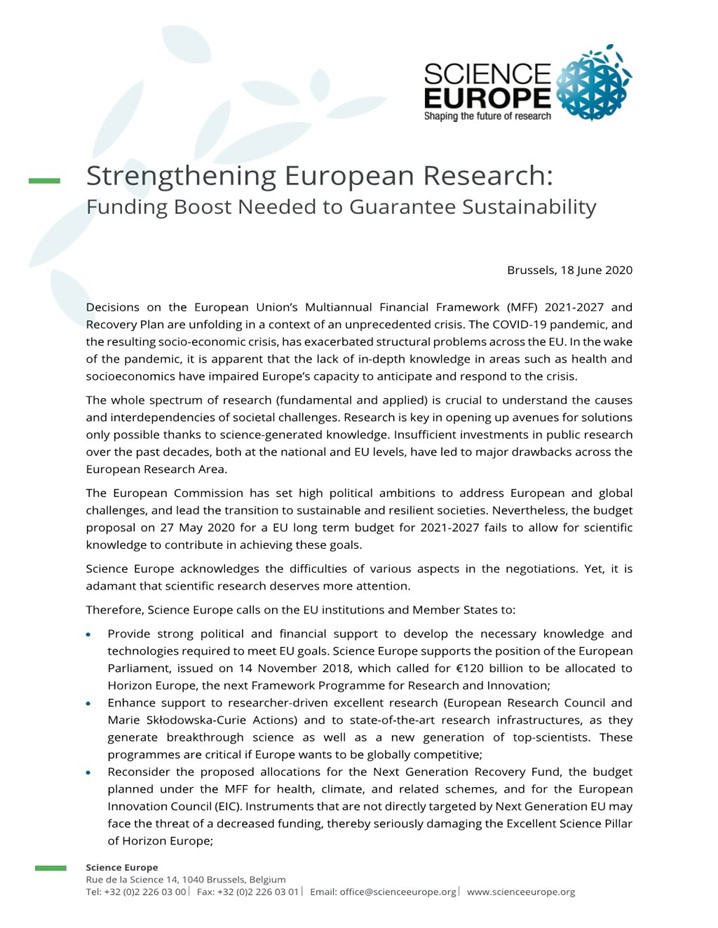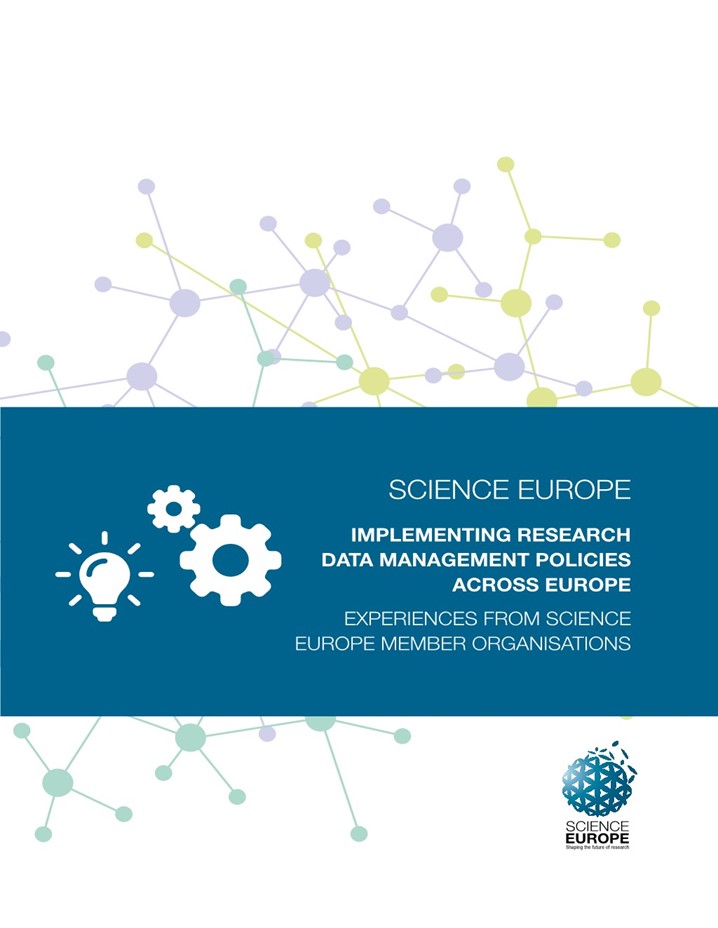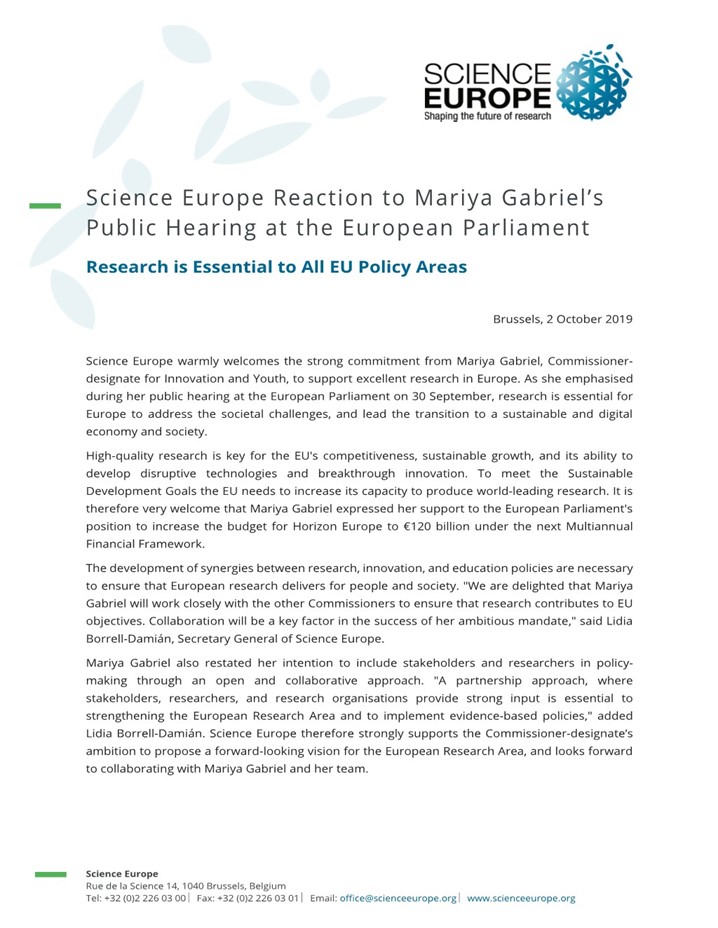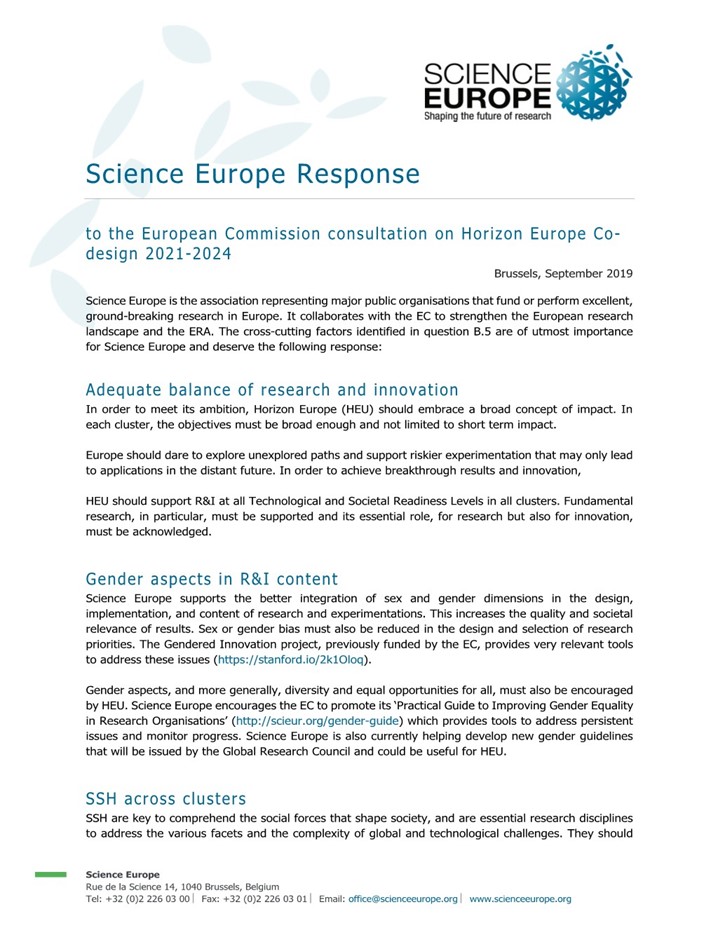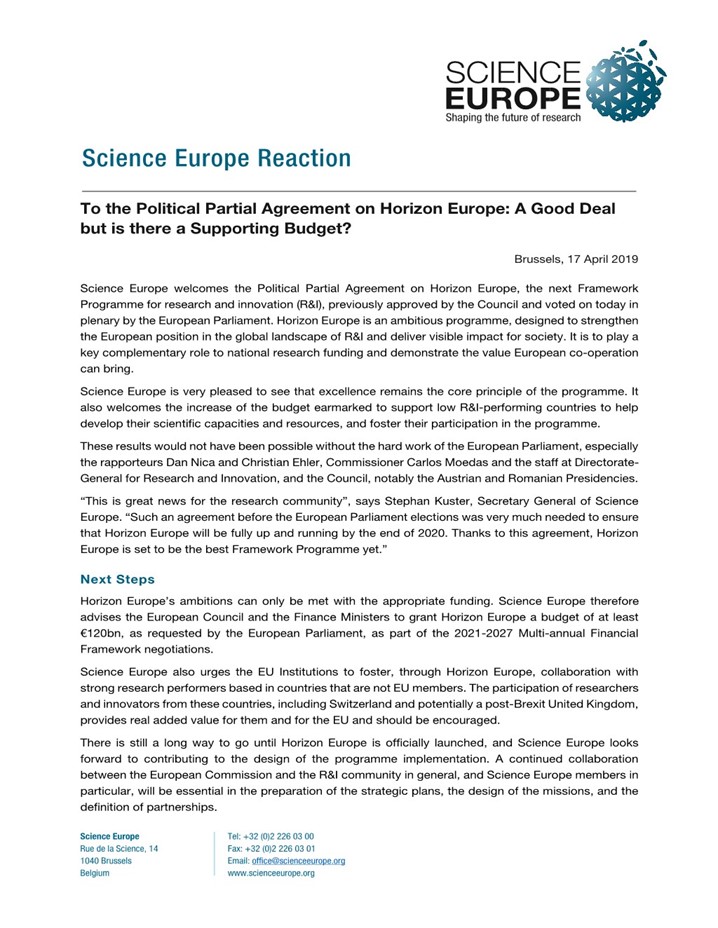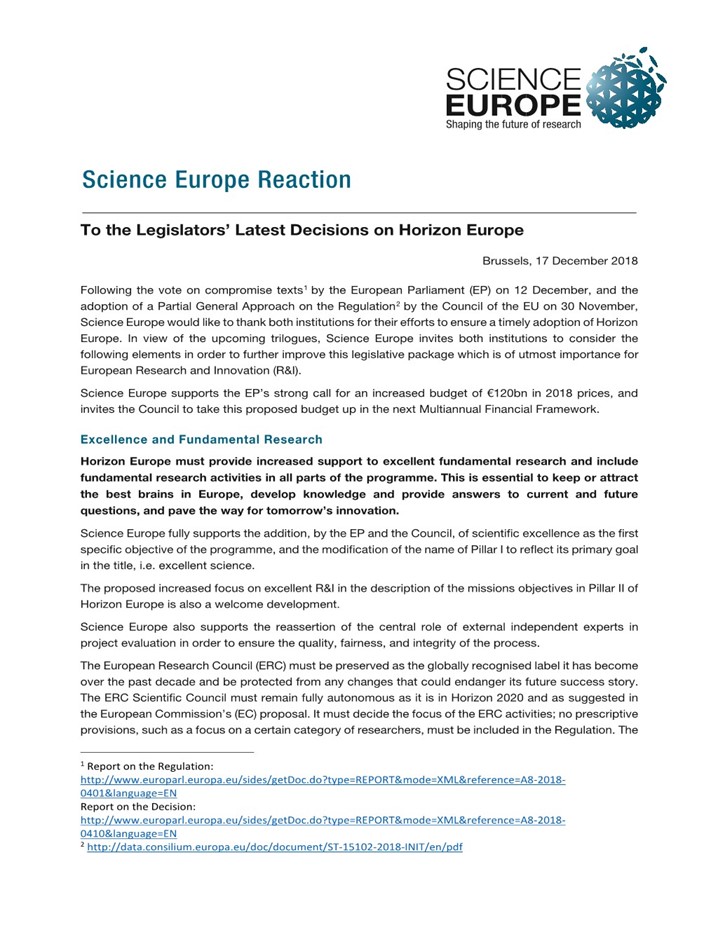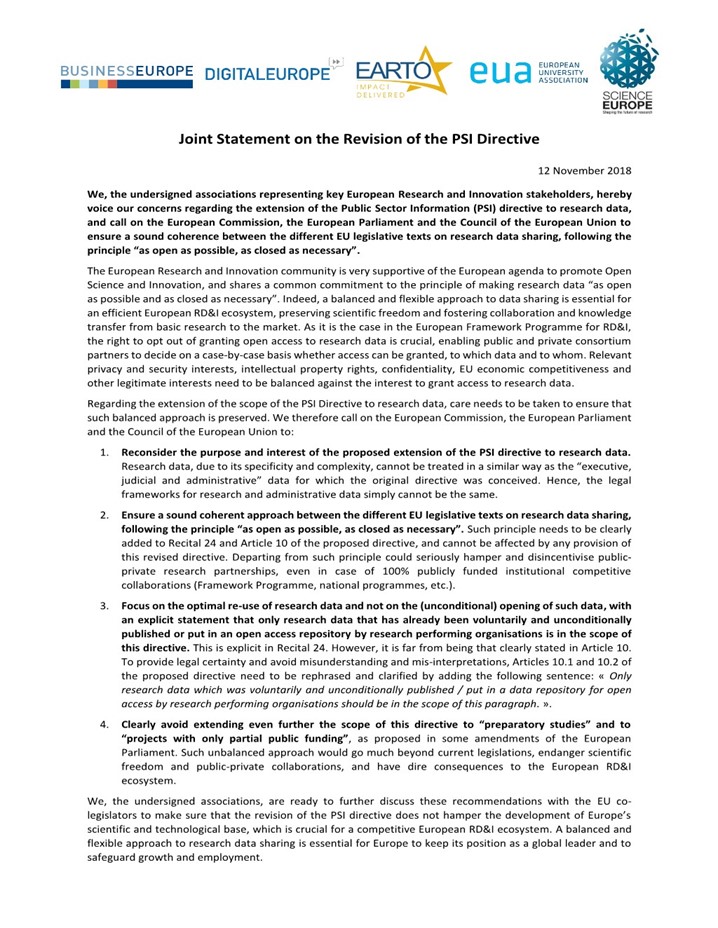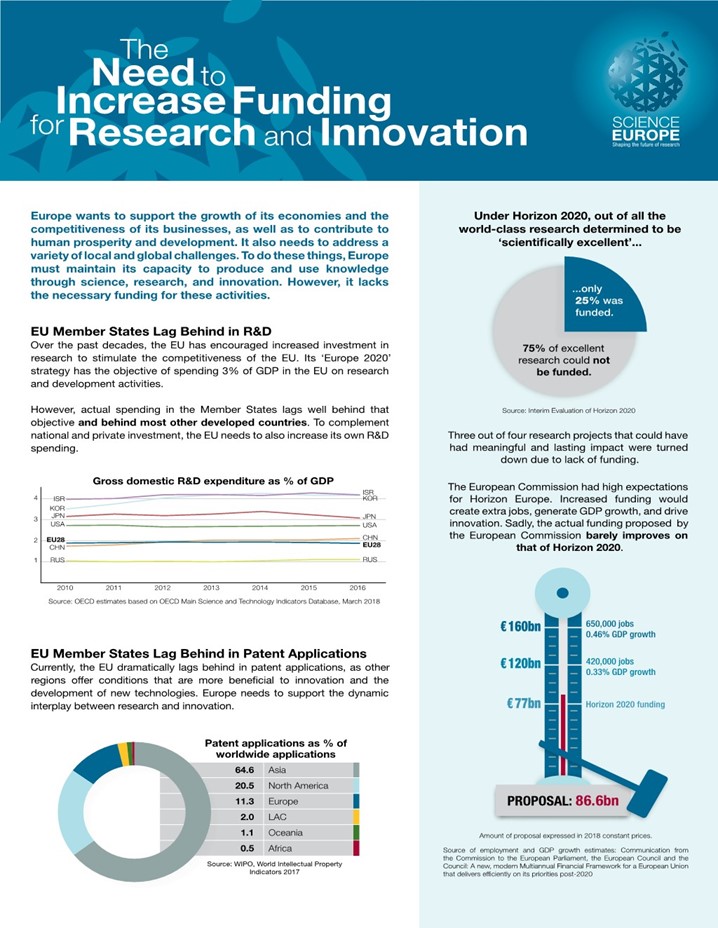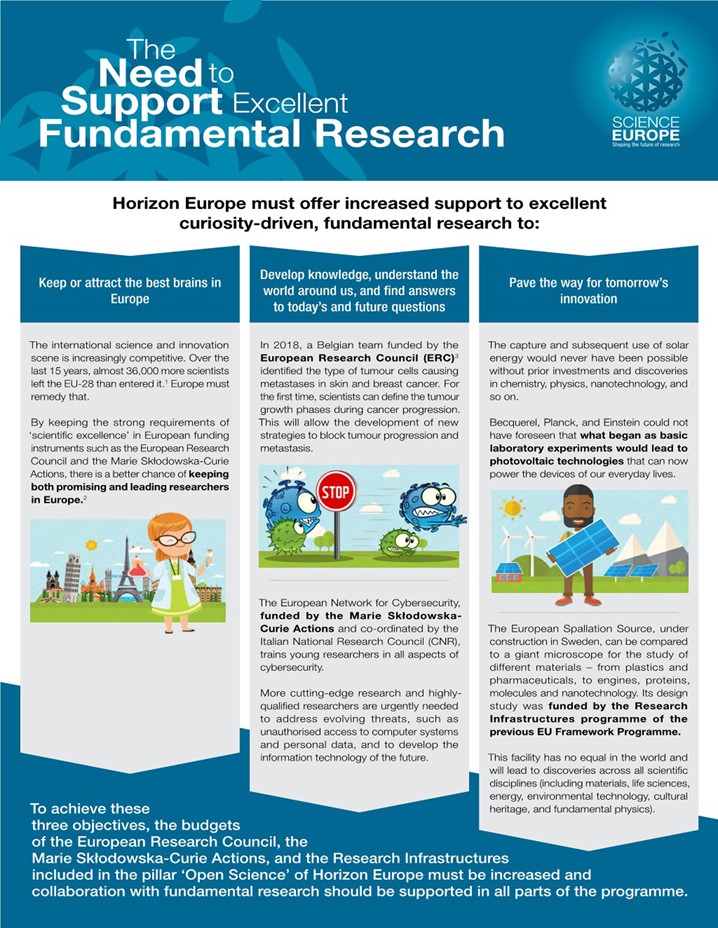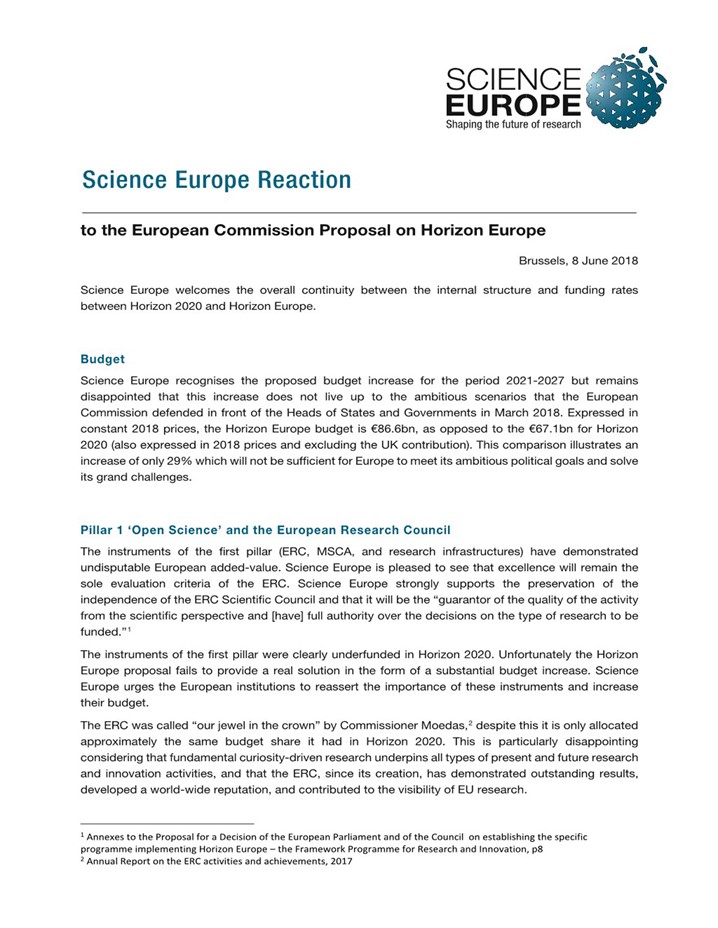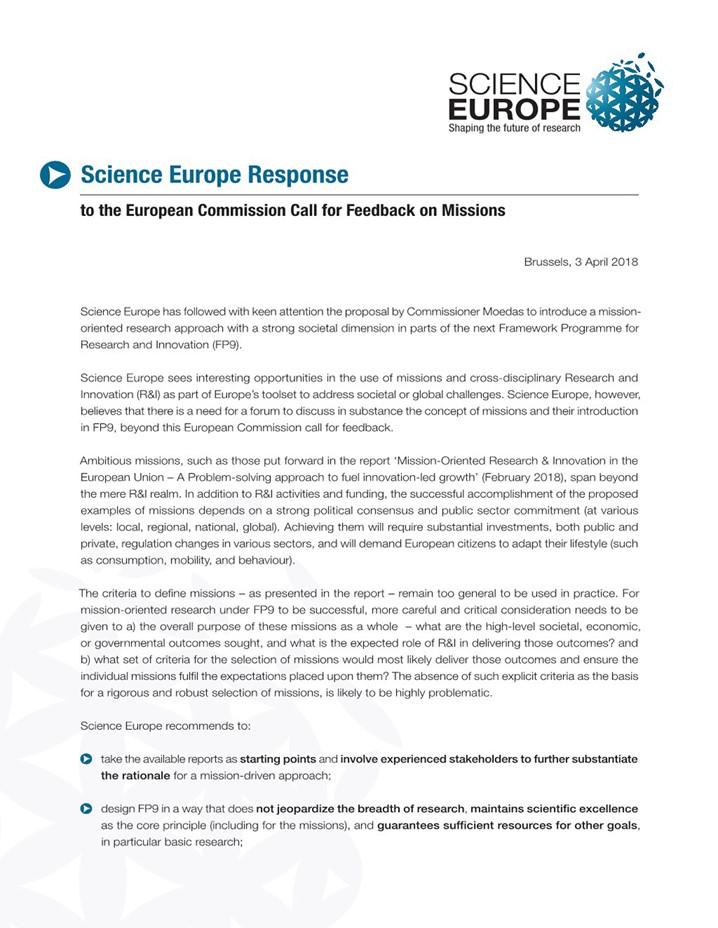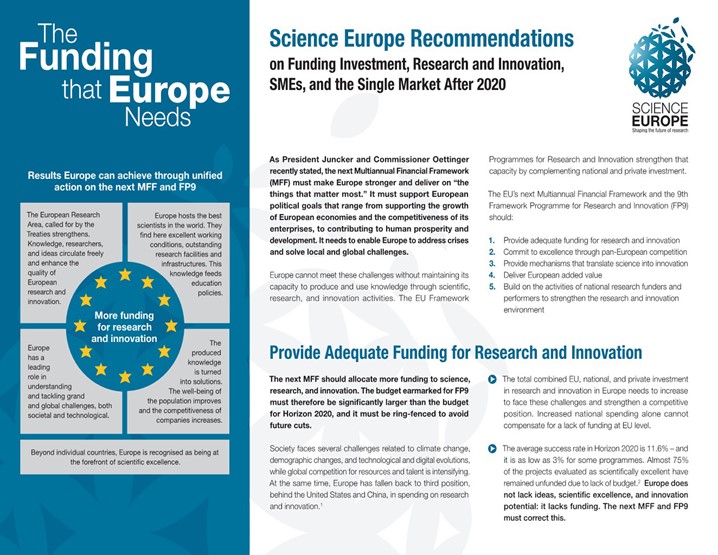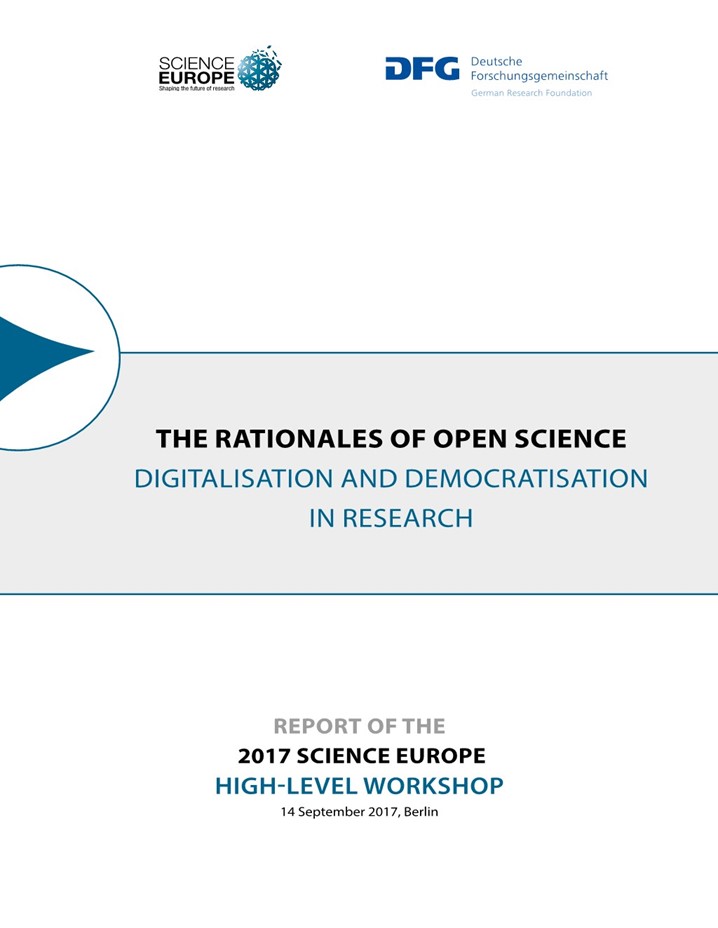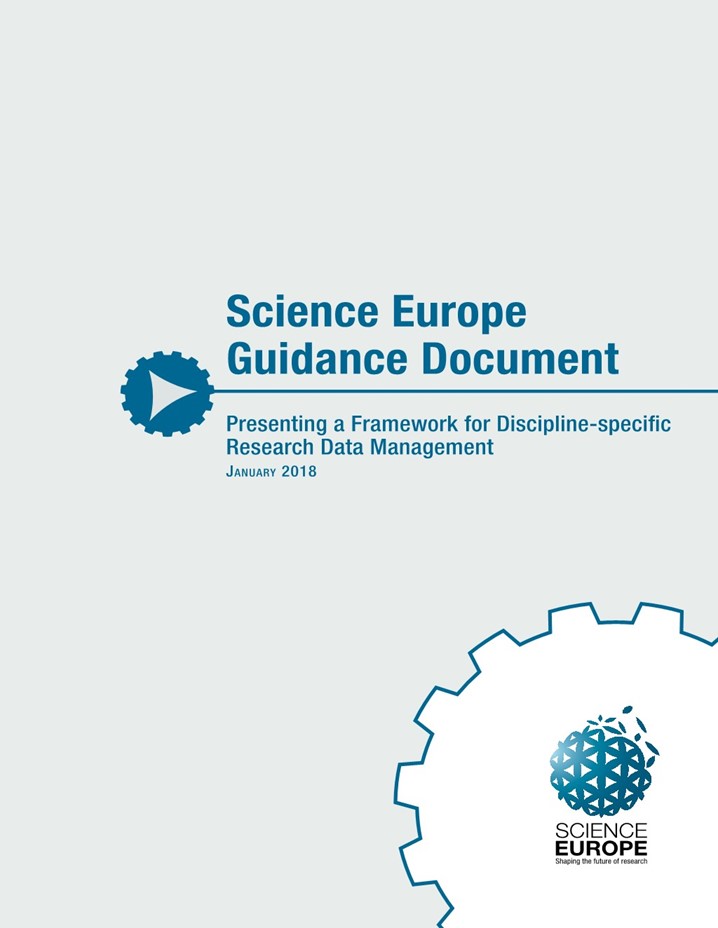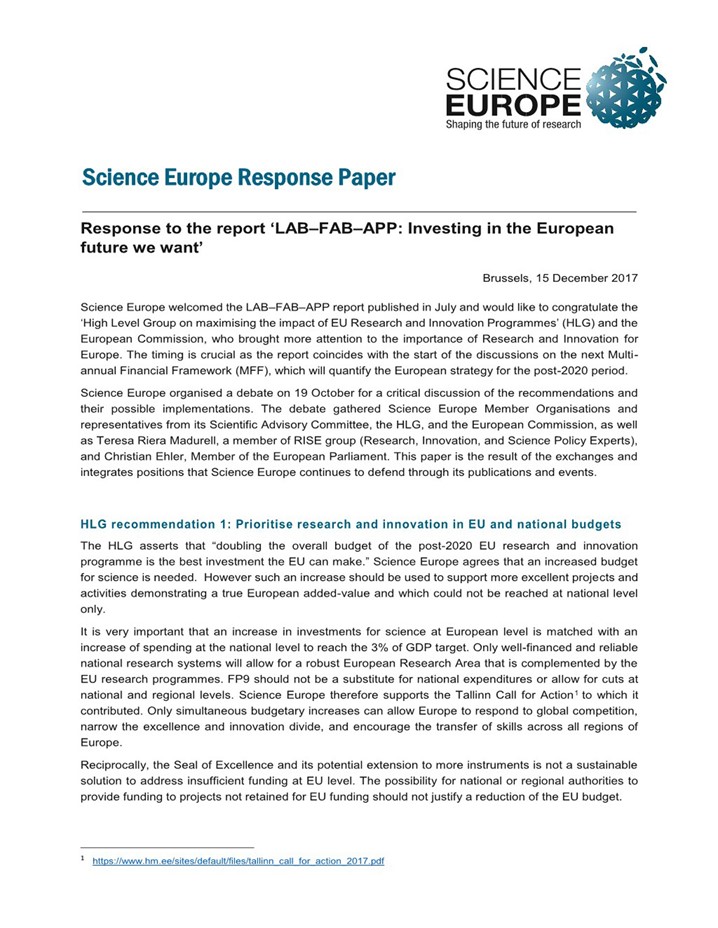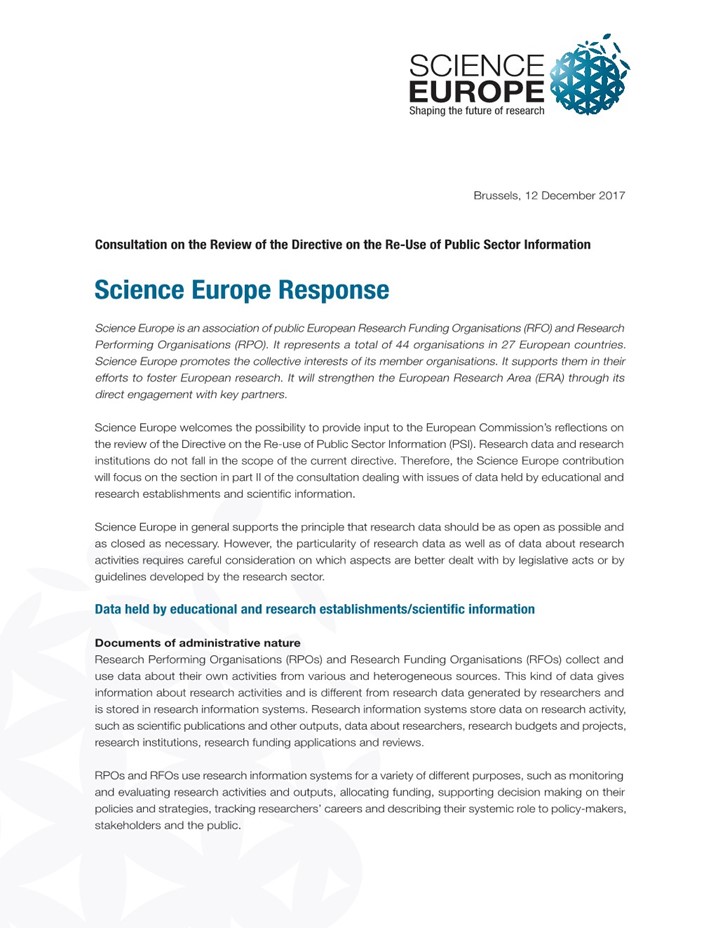Member-only content is available on this page. Please log in to view this content.

Our resources
Discover Science Europe’s comprehensive library of resources, including the most recent publications, briefings, and position statements.
127 resource(s) found
Commentary on the FAIRsharing Data Repository Selection Proposal
Practical Guide to the International Alignment of Research Data Management - Extended Edition
Developed by experts from Science Europe Member Organisations, this guide aims to align research data management (RDM) requirements across research organisations. Originally released in 2019, it was updated in January 2021 to include guidance to support the evaluation of data management plans (DMPs).
Report of the 2020 High Level Workshop on ERA: The ERA Contribution to the post-COVID-19 Recovery and Transition to a Resilient Society
The 2020 edition of the Science Europe High Level Workshop on ERA was co-hosted with the Foundation for Science and Technology and the Portuguese Ministry of Science, Technology, and Higher Education. It explored how research and innovation can contribute to crisis recovery and to societal resilience in the context of an evolving research culture.
Response to the European Commission Consultation on the Horizon Europe First Strategic Plan 2021-2024
In its response to the European Commission, Science Europe outlines numerous topics that should be further addressed in order to create the best possible start for Horizon Europe. Such developments include striking the right balance between research and innovation, embedding the whole spectrum of equality aspects, better integration of Social Sciences and Humanities, and the creation of synergies between the various parts of the programme.
Response to the European Commission's Inception Impact Assessment on Artificial Intelligence
In its response to the European Commission, Science Europe highlights that future EU legislation on AI needs to strike the right balance between safeguards for users and developers of AI systems, and a legal environment that fosters R&I.
Response to the European Commission's Inception Impact Assessment on the Digital Services Act
In its response to the European Commission, Science Europe highlights that the foreseen scope of the new legislation is not clearly defined and greater clarification should be introduced to ensure that the Digital Services Act does not have unintended effects on research.
Response to the European Commission Roadmap on European Data Spaces
In its response to the European Commission Roadmap for an upcoming legislative proposal on the governance of common European data spaces, Science Europe reinforces the need to consider sectoral policies to ensure coherence.
Reaction to the European Council's Proposal for the European Budget
The Research and Innovation (R&I) sector has been sacrificed in these budget negotiations, when it should have been the spearhead of an ambitious, future-oriented, knowledge-based plan for Europe. Science Europe now calls the European Parliament and the European Commission, as the protectors of European R&I, to continue taking a strong stand in favour of a larger budget for Horizon Europe
Strengthening European Research: Funding Boost Needed to Guarantee Sustainability
Science Europe calls on the leaders of the EU to dedicate increased funding to research and innovation at the 19 June European Council meeting on the EU long-term budget and COVID-19 recovery fund.
An increased budget is necessary to meet the ambitious objectives of the European Union for a sustainable, healthy planet, and to ensure the global competitiveness of its research sector.
Science Europe also emphasises the need for sustained European leadership in tackling all COVID-19-incurred challenges.
Implementing Research Data Management Policies Across Europe: Experiences from Science Europe Member Organisations
Does your organisation want to develop requirements for data management plans (DMPs) or update existing ones?
Take a look at our latest publication to find out how to do so in three steps.
Reaction to Mariya Gabriel’s Public Hearing at the European Parliament: Research is Essential to All EU Policy Areas
Science Europe warmly welcomes the strong commitment from Mariya Gabriel, Commissioner-designate for Innovation and Youth, to support excellent research in Europe. Research is essential for Europe to address the societal challenges, and lead the transition to a sustainable and digital economy and society.
Science Europe Call to the European Institutions: The Need for an Ambitious Budget for Horizon 2020
Ahead of the trilogue negotiations on the EU Budget for 2020, Science Europe calls on the Council to agree to a substantial budgetary increase for Horizon 2020. Outcomes of Horizon 2020 provide a key contribution to long-term economic growth, European competitiveness, and in finding solutions to societal and global challenges.
Response to the European Commission Consultation on Horizon Europe Co-design 2021-2024
For Horizon Europe’s ‘Strategic Plan’ 2021-2024, Science Europe urges the European Commission to support cutting-edge research and innovation at all Technological and Societal Readiness Levels, and to adopt objectives that are not limited to short term impact. Europe should dare to explore unexplored paths and support riskier experimentation. Moreover, Science Europe recommends to reinforce a series of cross-cutting factors to increase the scientific, economic, and societal impacts of Horizon Europe.
Reaction to the Political Partial Agreement on Horizon Europe: A Good Deal but is there a Supporting Budget?
Science Europe welcomes the Political Partial Agreement on Horizon Europe, voted on today in plenary by the European Parliament. Science Europe is very pleased to see that excellence remains the core principle of the programme. However Horizon Europe’s ambitions can only be met with the appropriate funding and we therefore advise that Horizon Europe is granted a budget of at least €120bn.
Reaction to the Legislators’ Latest Decisions on Horizon Europe
In view of the upcoming trilogues between the three European institutions, Science Europe invites all parties to consider a series of elements to further improve the legislative package for Horizon Europe. The budget of €120bn proposed by the European Parliament is a very welcome proposal and should be taken up by the Council in the next Multiannual Financial Framework. Moreover, fundamental research must be included in all parts of the programme, including the European Innovation Council.
Joint Statement on the Revision of the PSI Directive
In this joint statement research and Innovation stakeholders call on the EU institutions to seek a balanced approach to data sharing in response to the European Commission’s proposal for a revision of the Directive on re-use of public sector information (PSI Directive). While the partners are supportive of the European agenda to promote Open Science and innovation, and share a common commitment to the principle of making research data ‘as open as possible and as closed as necessary’, there is a need to focus on the optimal re-use of research data and not on the (unconditional) opening of such data.
Factsheet on the Need to Increase Funding for Research and Innovation
The overall funding for research and innovation in Europe needs to be increased and an adequate ring-fenced budget should be provided for Horizon Europe. In this factsheet Science Europe illustrates some of the reasons why.
Factsheet on the Need to Support Fundamental Research
The European Commission proposal for Horizon Europe falls short of acknowledging the importance of fundamental research. This factsheet demonstrates the essential role fundamental research plays, not only for research, but also for innovation.
Reaction to the European Commission Proposal on Horizon Europe
Science Europe welcomes the overall continuity between the internal structure and funding rates between Horizon 2020 and Horizon Europe. However, the proposed budget increase for the period 2021-2027 does not live up to the ambitious scenarios defended by the European Commission in front of the Heads of States and Governments in March 2018 and will not be sufficient for Europe to meet its ambitious political goals.
Response to the European Commission Call for Feedback on Missions
Science Europe sees interesting opportunities in the use of missions and cross-disciplinary Research and Innovation as part of Europe’s toolset to address societal or global challenges. However, the criteria for selecting missions so far have been too broad and more discussion is needed on the concept of missions and their introduction in FP9.
The Funding that Europe Needs: Recommendations on the Multiannual Financial Framework
The Multiannual Financial Frameworks (MFF) determine the budget allocation of the EU over a period of seven years. Science Europe recommends strengthening science, research, and innovation by increasing their budget in the MFF for 2021–2027 and to take measures to ensure that the 9th Framework Programme for Research and Innovation will have the capacity to achieve its goals.
The Rationales of Open Science: Digitalisation and Democratisation in Research
How can citizens best be involved in the scientific process, and how ‘Open’ can we make science? How do we ensure that the highest standards in scientific research are maintained in such a system? This report provides an overview of the main discussions at the 2017 Science Europe High-level Workshop hosted in Berlin by the German Research Foundation (DFG).
Guidance Document Presenting a Framework for Discipline-specific Research Data Management
Research organisations and funders increasingly ask researchers to create Data Management Plans for their work and proposals. A lack of standardisation means that these can be time-consuming to create and difficult to compare and evaluate. Science Europe presents a framework for the creation of domain-specific protocols that can be used as standardised templates, reducing the administrative burden on both researchers, research organisations, and funders.
Response to the Report ‘LAB–FAB–APP: Investing in the European Future we want’
This is Science Europe’s response to the report ‘LAB–FAB–APP: Investing in the European Future we want’ by the High Level Group on maximising the impact of EU Research and Innovation Programmes. It outlines points of agreement, as well as additional or alternative recommendations, from Science Europe Member Organisations on how the future of European research should take shape.
Response to the Consultation on the Review of the Directive on the Re-Use of Public Sector Information
Science Europe supports the principle that research data should be “as open as possible and as closed as necessary.” However, the particularity of research data as well as of data about research activities requires careful consideration on which aspects are better dealt with by legislative acts or by guidelines developed by the research sector.






